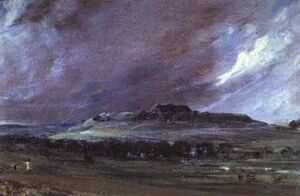Rotten borough facts for kids

A rotten borough was a special kind of place in the United Kingdom that could elect people to Parliament. This was a long time ago, before a big change happened in 1832. These places had very few voters, sometimes even none! This meant that a powerful person, called a "patron" or "owner," could easily choose who would become a Member of Parliament (MP) for that area. It was like they owned the right to send someone to the government.
Contents
What Were Rotten Boroughs?
A rotten borough was a type of parliamentary borough in the UK. Before the Reform Act 1832, these boroughs had a very small number of people who could vote. Sometimes, there were only a handful of voters, or even no people living there at all!
How Did Rotten Boroughs Work?
Because so few people could vote, a wealthy or powerful person could easily control who got elected. This person was called a "patron" or "owner." They could make sure their chosen person got a seat in the House of Commons. This often happened without any real competition or election. It was a way for powerful families to get their friends or relatives into Parliament.
Famous Examples of Rotten Boroughs
One of the most well-known rotten boroughs was Old Sarum in Wiltshire. You can see a picture of it above. Even though it was just an uninhabited hill, it still elected two Members of Parliament! The Pitt family owned Old Sarum for many years.
- One famous person who became an MP for Old Sarum was William Pitt the Elder. He later became a Prime Minister of the UK.
- In 1802, the Pitt family sold Old Sarum for a huge amount of money, £60,000. This was much more than the land itself was worth. They were selling the power to choose MPs.
Another example was Charles Howard, 11th Duke of Norfolk. He was so powerful that he controlled eleven different boroughs! This meant he could choose eleven people to send to Parliament.
Why Were Rotten Boroughs a Problem?
Rotten boroughs were seen as unfair because they did not represent the people. Large, growing towns like Manchester or Birmingham had no MPs, while tiny places with almost no people had two. This system allowed a few powerful individuals to have too much influence in the government. It was a form of corruption in the political system.
The End of Rotten Boroughs
The unfairness of rotten boroughs led to many calls for change. People wanted a fairer system where more people could vote and where MPs truly represented the areas they came from.
- The Reform Act 1832 was a very important law.
- This act put an end to rotten boroughs.
- It changed how MPs were elected and gave more people the right to vote.
- This was a big step towards a more democratic system in the United Kingdom.
See also
 In Spanish: Burgo podrido para niños
In Spanish: Burgo podrido para niños
 | Emma Amos |
 | Edward Mitchell Bannister |
 | Larry D. Alexander |
 | Ernie Barnes |

